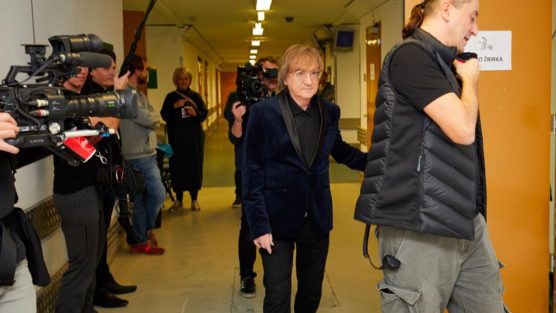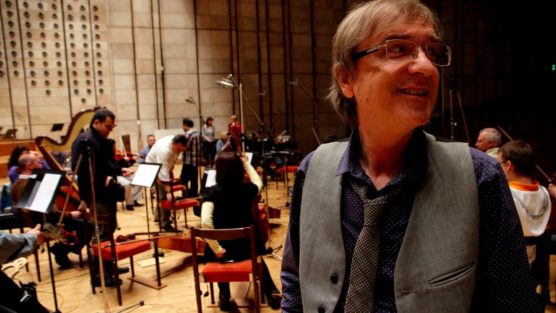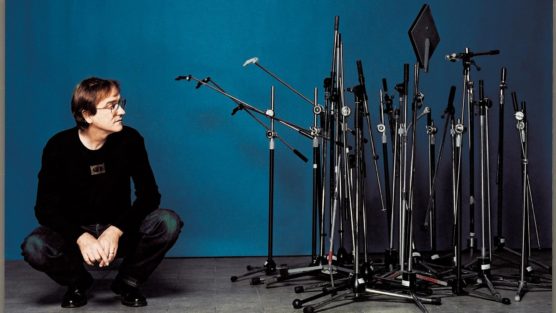After King Skate, in which you mapped the entire community of the first Czech skateboarders, why did you decide to portray only one person?
I love music documentaries, I have loved music since I was a child, but I can’t sing. So at least I worked as a DJ for a long time, and I have done quite a number of music videos.
When we were finishing my previous documentary, King Skate, one day we were sitting with the producers in the company Negativ’s offices and producer Kateřina Černá mentioned they were thinking about a documentary about Meky and were looking for a director. And I immediately said I was interested. Among other things, I was attracted by the idea of spending some time with only one hero, focusing on one portrait. When Meky came to see King Skate at the Karlovy Vary festival, he liked how loud the film was – and we made a deal.
How did you collect the material, and how did the preparation of the film go?
As a first step, I read the book Zblízka (Up-close) written about Meky by Jan Vedral, and then I started working on how to process his whole life, how to fit 40 years of fame into an 80-minute film.
I was curious about who he really was since he’d been famous for so long, which is not the case for everyone. And I gradually came across a number of dramatic milestones in his life. His brother, who was a great role model and perhaps the closest person he had at the time, died young. He went through a divorce, and it bothered him as much as the fact that he didn’t see enough of his little daughter because he was just never home. So I started to get to know him more and more.
What was the most interesting aspect of getting to know him?
Above all, the fact that Meky, as a professional, took the more difficult and reasonless road. When he won the Zlatý slavík (Golden Nightingale) award in 1982, it was a phenomenal affair because he defeated Karel Gott! And instead of indulging in his grandiose success and continuing to make the so-called intelligent pop music, he and Laco Lučenič started making electronic music.
He completely changed his image, threw the little glasses away, started writing darker songs – for example, Do člunu mi stále teče voda (My boat is taking on water). I think that changing the rules of the game while being at the peak of your popularity does not happen just because, and it sparked my interest.
And then there was another challenge. When I started preparing the movie, I realized that although everyone knows his songs, nobody really knows much about him. People often thought he was just a boring gentleman. And I thought it would be fun to find out why people perceived him like this and also maybe turn the perception of the public.
If we could say that King Skate and Meky have something in common, it would be the immense amount of archival resources and a minimum of interviews with other people. Where does your method come from?
I don’t like talking heads in films. I like the language of pictures, gestures, collages. I admire Asif Kapadia’s way of making documentary films (e.g., Diego Maradona – editor’s note). And here we had access to a lot of material, from the Czech and Slovak TV and also from his personal archive. So, with the editor Šimon Hájek, we brought about 100 hours of material just to the editing room, and I have seen much more. And there were interesting things, for example, I found out that in Slovakia in the 1980s, journalistic programs were made with way more imagination than in Czechia. We then worked with those 100 hours, we were mainly after emotions, symbolism. Šimon Hájek is fantastic at that, he did a tremendous amount of work on the film.
So what Meky can viewers look forward to seeing? To me personally, he seems quite pensive, but underneath, I see a spark of a great sense of humor…
When someone has been in show business for forty years and, in addition, his popularity never dropped, he knows pretty well how to look. When I interviewed Kapadia about Maradona last year in Cannes, the question arose as to whether he had ever seen him angry. And Kapadia replied, “Never. Because if Maradona is upset, they won’t let you see him.”
In the beginning, we shot the main interview with Meky. We spent three days together, and after the first day, I realized that he was well aware of the camera. Which I didn’t want. That’s why I told the cinematographer Martin Žiaran to keep shooting all the time, not to turn off the camera at all. This was the only chance Meky would eventually stop perceiving it. Hopefully, it worked.
Meky has a great sense of humor but the sort that is not in plain view. He is a great observer of human behavior, but it also comes in flashes. His comfort zone is not to dwell in the past but to compose songs. And anything else he has to do is a little annoying for him. We had also captured situational humor, but we had to throw away a lot of things because the film was not inflatable, and you have to be strict in the editing room to keep the film together and not let it break to pieces. (c) Věra Míšková, Právo












